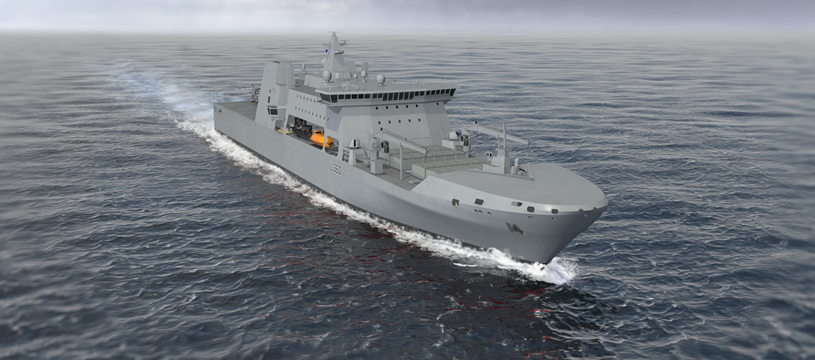BMT, a leading international multi-disciplinary engineering and ship design consultancy, will offer an updated concept design from its ELLIDA™ multi-role logistics ship design family for the Royal Australian Navy’s (RAN) Joint Support Ship project, SEA2200. The ELLIDA™ family of concept designs, launched in 2019, builds on the experience of other BMT designed vessels in-service in the auxiliary market.

The modifications to the eventual RAN requirements will take advantage of the concepts having been designed with flexibility to allow them to adapt to differing customer mission requirements. This is combined with BMT’s proven track record in developing specific solutions for naval customers. The design includes a ro-ro cargo capability, cargo stores and provision to allow replenishment at sea for fuel and dry stores, with a well dock to support amphibious operations.
ELLIDA™ has the utility to transport and deliver troops, vehicles, equipment and supplies to and from anywhere in the world in support of amphibious warfare and littoral operations, offering a versatile mix of ship-to-shore offloading and logistics capabilities to allow naval operations through landing craft, boat operations, multi-spot aviation and replenishment at sea. The centre of the ship has two extensive decks with flexible space for either vehicles, containers or equipment, ensuring the vessel has the flexibility to adapt to differing mission requirements.
Primarily a logistics ship with considerable capacity to carry solid stores and flexible options for loading, transferring or unloading, ELLIDA™ has been designed to provide strategic logistic transportation of rolling cargo, vehicles, troops and freight between operational areas to deliver support to amphibious operations using landing craft and helicopters. Also designed to operate as a humanitarian disaster response vessel, the design is flexible to allow the addition of enhanced medical and/or Replenishment at Sea facilities.
Trevor Dove, Senior Business Development Manager, BMT, commented:
‘Auxiliary amphibious vessels provide essential logistic support to sustain troops ashore. With many navies re-evaluating amphibious warfare operations in response to modern mission requirements, it is essential that support vessels are able to keep pace with evolving requirements to ensure vital logistical and supply needs are met. Navies around the world need to be equipped with auxiliary platforms that have the flexibility to support global operations whilst maintaining the highest levels of safely and reliability, and we are confident that the ELLIDA™ family of vessels will deliver against these requirements.’
The ELLIDA™ multi-role logistics ship is the third in the family of vessels designed by BMT for the auxiliary market, complimenting the AEGIR family already in service with the Royal Fleet Auxiliary and the Royal Norwegian Navy and SALVAS concept. In developing the ELLIDA™ design, BMT applied the knowledge gleaned through the development of operational concepts against current and future doctrines of several navies. The concept is designed to be able to react to the dynamic functional requirements of military commanders in support of government policy for several different nations.
As the trusted partner for scientific and engineering-led advice, solutions, programmes and services, ELLIDA™ will be designed in Australia, drawing on BMT’s global capabilities in ship design. Operating in six states in Australia since 2005, BMT has been supporting numerous major defence projects including the Air Warfare Destroyer platform design support, Amphibious Assault Ship (LHD) operational safety case and Auxiliary Tanker Double hull design.
Commenting on BMT’s capabilities in Australia, Dove continued:
‘BMT is proud of the long history we have in supporting Australia’s naval capability, drawing on the extensive experience of our in-country experts to harness the knowledge we have gleaned through global ship design programmes to ensure we are delivering the best possible capabilities to the RAN, with platform designs that are fit-for-purpose and able to meet the needs of evolving mission requirements.’